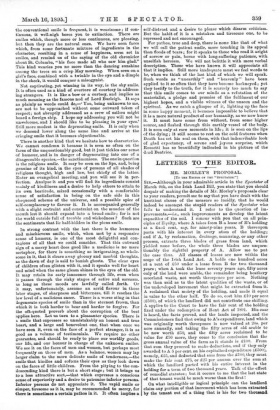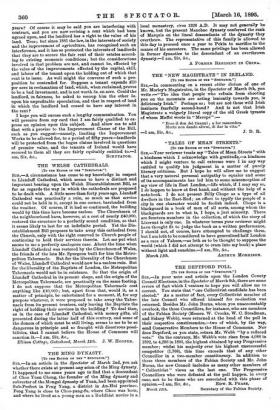LETTERS TO THE EDITOR.
MR. MORLEY'S PROPOSAL.
[To THY EDITOR Or THE " SPECTATOR?'] Sin,—Although in your admirable article in the Spectator of March 9th, on the Irish Land Bill, you state that you should despair of making the details of Mr. Morley's proposals clear to your readers, permit me to say that you have dealt with the knottiest clause of the measure so lucidly, that he would indeed be amongst the stupid readers of the Spectator who fails to understand it. I refer to the question of im- provements,—i.e., such improvements as develop the latent capacities of the soil. I concur with you that on all prin- ciples of Equity, where A takes from B a lease of B's holding at a fixed rent, say, for ninety-nine years, B thereupon parts with his interest in every atom of the holding; and if A, by reclamation, drainage, manuring, or any other process, extracts three blades of grass from land, which yielded none before, the whole three blades are unques- tionably the rightful property of A. Allow me to put the case thus. All classes of leases are now within the scope of the Irish Land Act. A holds one hundred acres at a rent of £50 under a lease from B for two thousand years ; when A. took the lease seventy years ago, fifty acres only of the land were arable, the remainder being heathery moorland waste, not worth threepence per acre. Nothing was then said as to the latent qualities of the waste, or of the undeveloped increment that might be extracted from it. A. reclaimed that moiety of the holding, and made it equal in value to the other half. To do so, cost him 210 per acre (2500), of which the landlord did not contribute one shilling. A. applies to the Court to have the fair rent of the holding fixed under the redemption of Rent Act of 1891. His case is heard, the facts proved, and the lands inspected, and the Commissioners find that owing to A's expenditure, land which was originally worth threepence is now valued at 20s. per acre annually, and taking the fifty acres of old arable to be now worth £50, and the fifty acres reclaimed to be value for 250 more, they come to the conclusion that the gross annual value of the farm as it stands is £100. From that sum they proceed to make deductions, and if they only awarded to A 5 per cent. on his capitalised expenditure (£500), namely, 225, and deducted that sum from the £100, they must make the fair rent £75, or 225 per annum over the sum at which the landlord parted with his entire interest in the holding for a term of two thousand years. Talk of the effect of remedial statutes; but it occurs to me that the last state of that tenant would be much worse than the first !
On what intelligible or logical principle can the landlord claim any portion of that increment which has been extracted by the tenant out of a thing that is his for two thousand
years ? Of course it may be said you are interfering with contract, and you are now revising a rent which had been agreed upon, and the landlord has a right to the value of his land. True; but since 1881 the law, in the interests of society and the improvement of agriculture, has recognised such an interference, and it has so protected the interests of landlords that they are to secure the fair rent of their estates accord- ing to existing economic conditions ; but the considerations involved in that problem are not, and cannot be, effected by the value of the improvements effected by the capital, skill, and labour of the tenant upon the holding out of which that rent is to issue. As well might the converse of such a pro- position be contended for. Suppose a tenant expends 210 per acre in reclamation of land, which, when reclaimed, proves to be a bad investment, and is not worth 5s. an acre. Could the landlord, in fairness, be asked to recoup him the other 5s. upon his unprofitable speculation, and that in respect of land in which the landlord had ceased to have any interest in the rent ?
I hope you will excuse such a lengthy communication. You will perceive from my card that I am fairly qualified to ex- press an opinion upon this subject. And allow me to add that with a proviso to the Improvement Clause of the Bill, such as you suggest—namely, limiting the Improvement Works to be allowed for, to a period of fifty years—landlords will be protected from the bogus claims involved in questions of premier value, and the tenants of Ireland would have secured to them all they are fairly equitably entitled to.—I



































 Previous page
Previous page